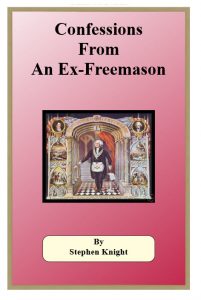Confession made by a former Grand Inspector Inquisitor Commander of the Thirty-First Degree of the Ancient and Accepted Rite who had withdrawn from Masonry in 1968 for religious reasons.
He was a judge, and a particularly quick-tempered one. We spent a long time talking about Masonry and religion, but after a while I began to ask him about the Ancient and Accepted Rite of the Thirty-Third Degree. About Masonry, he said quickly. ‘No, I dare not go into that,’ he said. ‘We’d better stick with religion.’ It seemed a perfectly normal answer . and sounded like the usual rebuff. But I thought immediately afterwards how strange it was that he had used the words ‘dare not’. Most people said, ‘I’d better not’, or ‘I’d rather not’. I remarked on his use of the word. He said, Anyone in public life has to be cautious.’
‘Cautious,’ I repeated. ‘That’s a Masonic word of recognition.’
‘You’ve obviously delved into the ritual, so you know,’ he said. ‘But I mean cautious in the sense everybody understands it.’
‘What must you be cautious about?’
‘I don’t like this line of questioning. I agreed to speak to you in general terms about why my commitment to Jesus is incompatible with the Masonic religion. I do not wish to be drawn into discussion of matters covered by whatever undertakings I have … taken.’
‘By undertakings, do you mean Masonic oaths?’
He paused. ‘Yes, I do. I prefer the word obligation to oath. It’s not the same.’
I remember thinking as I turned the conversation back on to the track I wanted it to follow that it would be interesting later on to return to this question of the distinction between an obligation and an oath. I never did.
‘Why do you have to be cautious, careful’, I said. ‘You’re not a Mason any more. I’ve got copies of all the rituals of the 4th to 33rd degree. There is no obligation which could possibly be interpreted to forbid you from telling me what you meant when you used the word “dare” in an ordinary conversation.’
